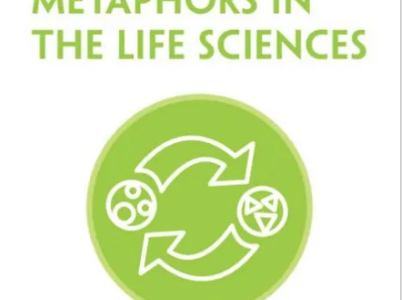Science, philosophy and metaphor (a post by Andrew Reynolds)
November 5, 2021
Soon a book will appear that will be of interest to life scientists and metaphor scientists alike. It is by Andrew Reynolds and entitled Understanding Metaphors in the Life Sciences (please click through for more information!). It is one of the many interesting books in Cambridge University’s Understanding Life series, including, for example, Understanding Genes, …
Maps, books and jigsaws: The human genome is back
June 11, 2021
I was recently messing about on the news database Nexis when I came across this pronouncement from 1982!! “Weissmann appealed directly to the delegates for an international basic-research fund to determine how genes function and their relationship to disease. With current technology, he declared, mapping the entire human genome would require some 50,000 man-years and …
From ‘deadly enemy’ to ‘covidiots’: Words matter when talking about COVID-19
June 8, 2021
This article, by Ruth Derksen, is republished from The Conversation under a Creative Commons license. Read the original article here. I thought it would make a great addition to the covid collection on ‘Making Science Public’ and I am grateful to Ruth for her permission to republish it. Dr. Ruth Derksen is a Senior Instructor …
The coronavirus: A global metaphor
May 14, 2021
In cognitive linguistics there is a long-running debate about whether some metaphors are universal or near-universal or whether metaphors are more culture specific. I don’t really want to get into that controversy here, but recent work by Ahmed Abdel-Raheem made me think about it again. In this post I argue that it might be good for …
Genetically modified mosquitoes and creatively unmodified metaphors
May 7, 2021
Last week genetically modified (GM) mosquitoes were released in Florida. One news item reported the event as follows: “The British company Oxitec released a cloud of hundreds of millions of genetically modified mosquitoes to study how to control their reproduction and thus stop the spread of dengue, Zika, malaria, etc.” (Entrepreneur, 4 May, 2021). What type of genetic …
How the pandemic is shaping worldviews
April 23, 2021
This is a guest post by Ahmed Abdel-Raheem. Ahmed is a postdoc in linguistics at the University of Bremen, Germany, and former Assistant Professor at the Department of English Studies at Maria Curie-Skłodowska University in Lublin, Poland. He is the author of Pictorial Framing in Moral Politics: A Corpus-Based Experimental Study (Routledge, 2019). *** It is …
A new variant in covid speak
April 9, 2021
A couple of weeks ago, Andrew Reynolds alerted me to an interesting new variant in covid speak, a metaphor used by the Canadian Chief Public Health Officer Dr. Theresa Tam in the context of talking about vaccines and variants (a variant is a virus with one or two mutations). As reported by CBC on March …
Metaphors, metaphors, metaphors
April 2, 2021
Recently somebody asked me something about metaphor and I thought to myself, what the heck do you know about metaphor? Actually, not an awful lot, given all the stuff I have written about it, or rather the stuff that I have written which involves some sort of reference to metaphor. So, I started to make …
Science, Technology & Culture: In memory of Christopher Johnson (1958-2017)
January 8, 2021
Almost 20 years ago, I was working at the Institute for Science and Society located in the Law and Social Sciences Building (then called the Institute for the Study of Genetics, Biorisks and Society). I don’t know how it happened, but somehow I must have come across somebody telling me that people were establishing a …
Protein folding and science communication: Between hype and humility
December 4, 2020
During the afternoon of the 30th of November, I looked at Twitter and saw that somebody had retweeted a tweet by Tom Whipple, the Times science editor, saying that in an hour he would announce a big science story. That retweet was an hour old. I got curious and hunted around a bit in the …
Subscribe by email
About this blog
This blog promotes discussion of topics related to the research programme 'Making Science Public: Challenges and Opportunities'. Our purpose is not to 'make science public'. Instead, we want to study the opportunities that have emerged for science to be more openly practiced and debated, but also the challenges posed by making science public or by promoting the making public of science as a solution to a variety of problems in society and in politics.
This blog will report on these and other issues related to the Leverhulme funded research programme: Making Science Public: Challenges and Opportunities
Useful links
Recent Posts
- Climate change and climate discourse: A dual disintegration
- Erving Goffman: Memories, method and metaphors
- Participation at the core: AI, ELSI and community engagement
- Understanding computational hermeneutics: Making meaning between the past and the present
- AI winter and AI bubble: Historical and metaphorical reflections
 MSP bookmarks
MSP bookmarks
- Twitter May 8, 2017
- Social innovations in Europe #RRI November 3, 2015
- Harvey Graff, the undisciplinarian September 20, 2015
- Replacing Pesticides With Genetics August 31, 2015
- Addressing hazardous chemicals in the circular economy August 25, 2015
Categories
- antibiotics
- anticipatory governance
- artifical intelligence
- big data
- biotechnology
- citizen science
- Climate Change
- Climate Politics
- co-production
- coronavirus
- Creationism
- Definition of Science
- designer babies
- disease
- disease
- engineering
- epigenetics
- Food Security
- Food sovereignty
- gene drive
- genomics
- GM Food
- GMOs
- history of science
- Hype
- images and visualisations
- imaginaries
- Immigration
- Impact
- infectious diseases
- innovation
- interdisciplinarity
- Knowledge Society
- Language
- Markets
- Metaphors
- microbiome
- neoliberalism
- Neuroscience
- open access
- Personal Reflection
- Politics
- Public education
- public engagement with science
- public needs
- public participation
- public policy
- public service
- publics
- regulatory science
- Religion
- Republican Party
- research impact
- responsible innovation
- responsive research
- Richard Dawkins
- risk
- Scepticism
- Science
- Science and Government
- science and politics
- Science and Songs
- science communication
- Science Communication
- Science Fiction
- Science Policy
- Social science
- sociology
- space
- space exploration
- synthetic biology
- transparency
- Trust
- Uncategorized
- Uncertainty
- visualisation
- wonder










